Grassroots Initiatives Honour and Remember Missing and Murdered Indigenous Women in Lead Up to February 14 Strawberry Ceremony
by Nicole Oliver
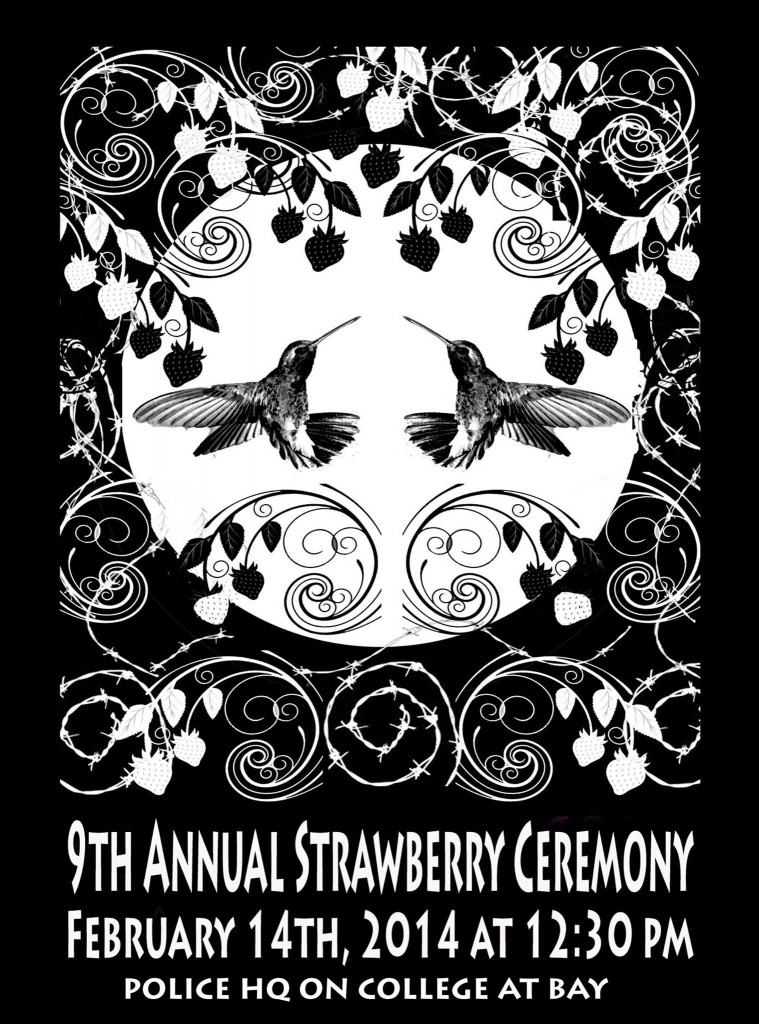 “We will come together again in Toronto this February 14th for the 9th year in a row. We stand together on this day to show our solidarity with the community of the downtown eastside in Vancouver where the Memorial March has been taking place for 23 years and because the violence is here too and inherent to settler colonialism”, Audrey Huntley of No More Silence shared with BASICS.
“We will come together again in Toronto this February 14th for the 9th year in a row. We stand together on this day to show our solidarity with the community of the downtown eastside in Vancouver where the Memorial March has been taking place for 23 years and because the violence is here too and inherent to settler colonialism”, Audrey Huntley of No More Silence shared with BASICS.
In January, 1991, a woman was murdered on Powell Street in Vancouver’s Downtown Eastside. Her family wanted to share their love for their daughter on Valentine’s Day and so the annual march began honouring women who have died violent and premature deaths. The family requests that her name not be spoken.
Indigenous women are five to seven times more likely than other women to die as the result of violence, cites Canadian government statistics. Still officers of the colonial state, including the police, have a track record of over-persecuting and under-protecting indigenous women. In Canada, Onkwehon:we (original) peoples make up four per cent of the population, yet First Nations, Inuit and Metis women account for 32.6 per cent of the inmates in the federal prison system.
To coincide with this year’s marches No More Silence, Families of Sisters in Spirit and their community partners including The Native Youth Sexual Health Network having been working on the creation of a community run database documenting violent deaths of indigenous women, two-spirited, and trans people.
”This year our hearts will be heavy with loss as we will grieve three beautiful lives cut far too short in 2013. Cheyenne, Terra and Bella were loved and leave behind family and friends whose lives have been shattered and forever shared,” Huntley told BASICS.
Since last year’s ceremony, Toronto has seen the unresolved violent deaths of three more indigenous women – Cheyenne Fox, Terra Gardner, and Bella Laboucan McLean .
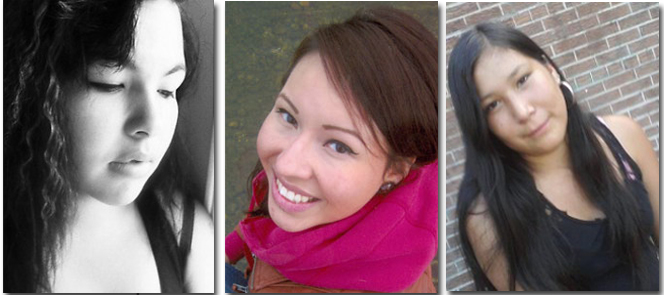
Cheyenne Fox, 20; Terra Gardner, 26; and Bella, 25, were all killed in violent deaths within a few months of each other. Bella and Cheyenne plunged to their deaths from condo highrises, while Terra was struck by a train near Summerhill station at a time when she was been compelled to testify in a murder investigation. Read this piece by Nicole Oliver for more info.
Between 2005-2010, the Native Women’s Association (NWAC) with the support of the federal government’s Status of Women Canada fund created the Sisters in Spirit project. This included a database with over 200 variables to record information related to missing and murdered indigenous women and girls in Canada. In 2010 the federal government decided to terminate funding to NWAC’s database project.
When the Sisters in Spirit database project funding was cut and the project terminated, 582 cases of missing and murdered indigenous women had been documented. Comparatively, in what is being described as a one of the most comprehensive fully public databases to date, Maryanne Pearce an Ottawa researcher, documents that 824 Inuit, Métis, or First Nations women have been murdered or gone missing in Canada since 1980. Pearce began this database as part of her doctoral dissertation in Law at the University of Ottawa.
The information documented through the Sisters in Spirit project remains inaccessible to the families of missing and murdered women and the wider public, despite the 10-million dollars of public funds allotted to compile the data. Initiatives by the federal government announced remaining funds would be directed to the RCMP for another database on missing persons with no particular focus on women, let alone Indigenous women. As the documentation was never made public the information collected cannot be validated nor analyzed by an outside party.
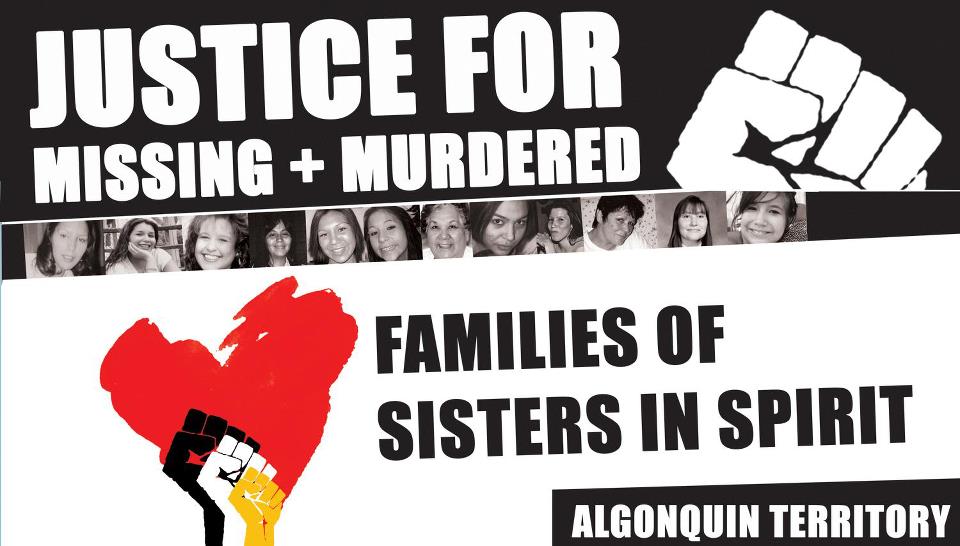 In response to the violence that continues to affect indigenous women, their families and communities, No More Silence, Families of Sisters in Spirit and community partners including The Native Youth Sexual Health Network envision a database beyond the reach of Canada’s institutions. The work of No More Silence and the database are to be part of building a larger movement not only against gendered colonial violence, but also for decolonization. This database is intended for the families of the missing and murdered and for communities to access, unlike NWAC’s exclusive database. No More Silence is a network of volunteers. They have started gathering information from nothing – with no funding and no data.
In response to the violence that continues to affect indigenous women, their families and communities, No More Silence, Families of Sisters in Spirit and community partners including The Native Youth Sexual Health Network envision a database beyond the reach of Canada’s institutions. The work of No More Silence and the database are to be part of building a larger movement not only against gendered colonial violence, but also for decolonization. This database is intended for the families of the missing and murdered and for communities to access, unlike NWAC’s exclusive database. No More Silence is a network of volunteers. They have started gathering information from nothing – with no funding and no data.
Since the research is led by and for Native women working with allies, it is not constrained by legal or academic definitions: the categories and understandings of the deaths and disappearances have been broadened, derived by rich process work with the families involved. The database documents the lives of women who have died violent and premature deaths, such as suicides and deaths not necessarily committed by one perpetrator, but have more to do with colonial violence in the context of a woman’s life. The database includes deaths and disappearances of Trans and Two-Spirit women as well, where information is often misconstrued or miscategorized by police databases and legal reports due to gender misrecognition constrained by heteropatriarchal norms. The documentation is not only about lives lost, but honors the lived memories of women who have passed on.
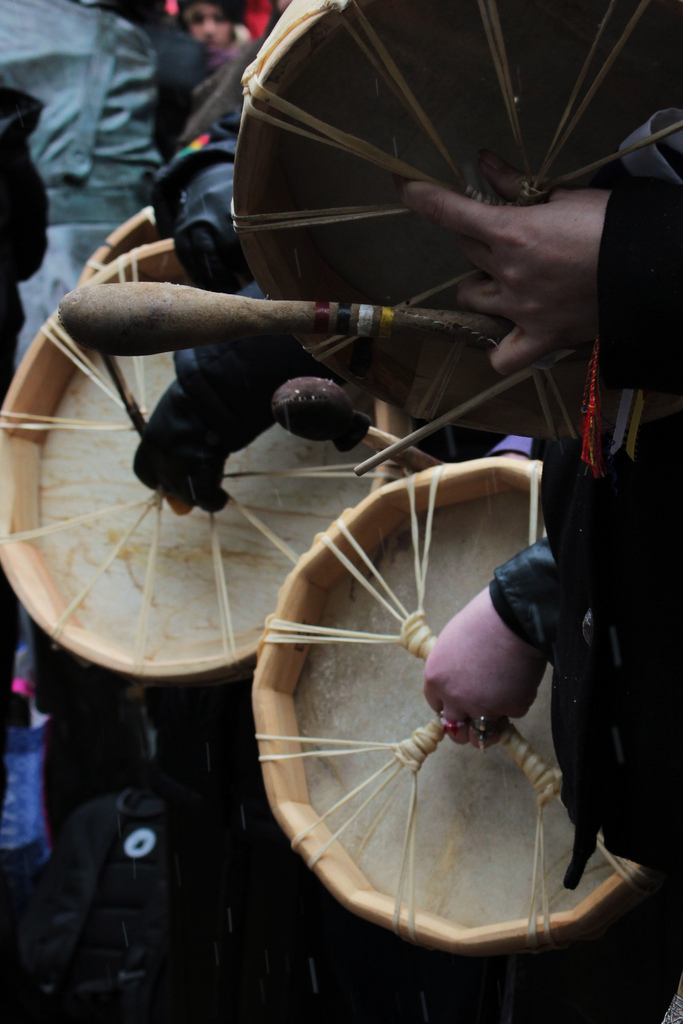
A scene from last year’s Strawberry Ceremony outside Toronto Police Headquarters.
Despite awareness and efforts of grassroots work done by networks like No More Silence and from the Annual Memorial Marches of February 14, the violence continues. This is not so surprising as the Canadian imperialist government increasingly pushes for resource extraction and development aggression on stolen lands and on unceded and treaty territories of First Nations peoples.
The degradation of the land often plays out on women’s bodies, as women are the life-bearers of future generations. There exists a direct relationship between rape and gender-based violence, racism, and colonialism, in which, violence against women becomes a tool of domination. Due to systemic violence inherent in Canadian state policies and practices – such as the Indian Act and the Residential School System – themes of intergenerational trauma, loss of land, housing issues, loss of family members, family breakdown, loss of a sense of community are part of many of the stories collected by No More Silence.
T
 hus, the February 14 Memorial Marches and the database work of Sisters in Spirit are about demonstrating that these lives matter. This year’s February 14 Strawberry Ceremony will be held in front of the Toronto Police Headquarters at 40 College St. West in Toronto. For information about February 14 marches occurring in different communities visit:
http://womensmemorialmarch.wordpress.com/national
.
hus, the February 14 Memorial Marches and the database work of Sisters in Spirit are about demonstrating that these lives matter. This year’s February 14 Strawberry Ceremony will be held in front of the Toronto Police Headquarters at 40 College St. West in Toronto. For information about February 14 marches occurring in different communities visit:
http://womensmemorialmarch.wordpress.com/national
.
Comments
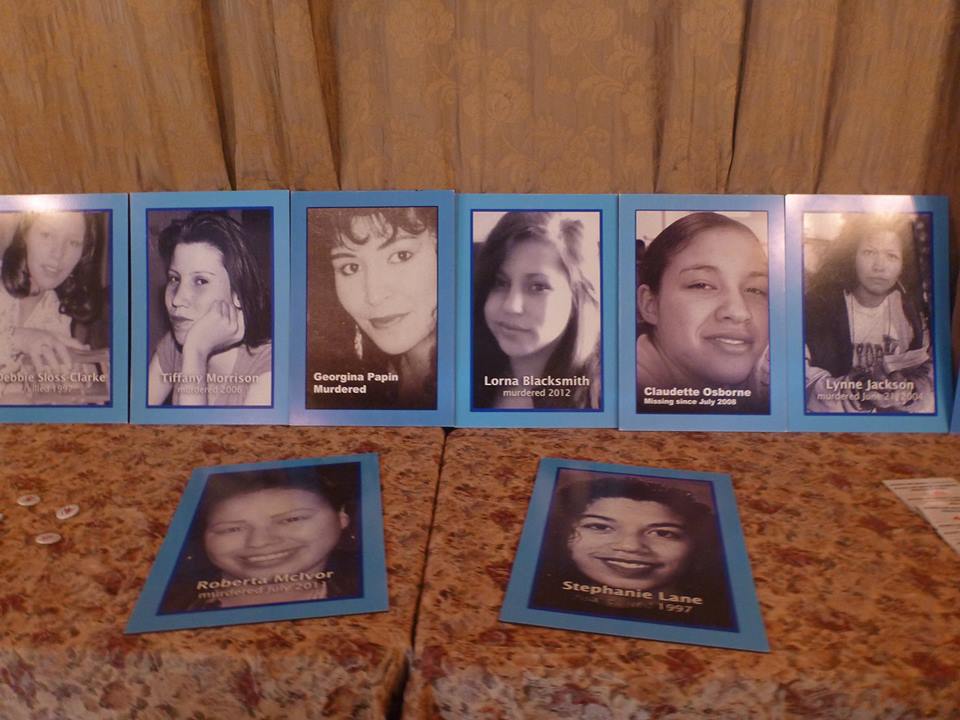
Pingback: Feb 14: Over 600 gather outside Police Headquarters to honour missing and murdered Indigenous women